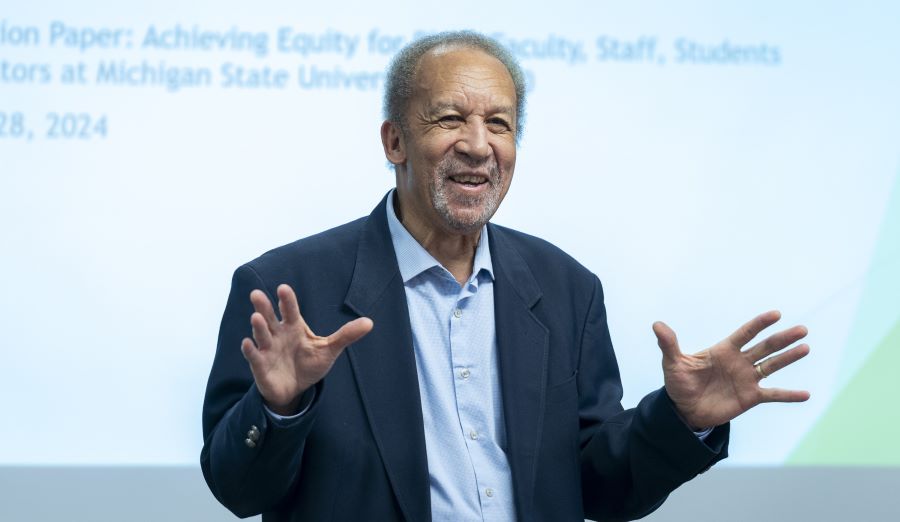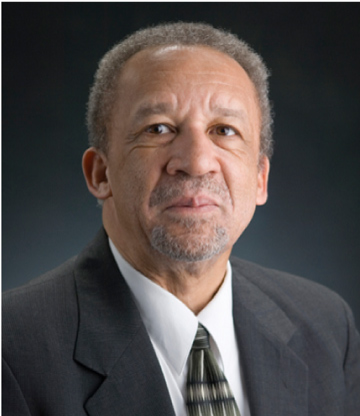Dr. Lee June Retires from Michigan State University after 52 years of service, social justice, and scholarship
June 2, 2025 - Shelly DeJong

After 52 years of service at Michigan State University, Dr. Lee June officially retired.
When Lee June arrived at Michigan State University in 1973, the campus looked dramatically different. Over his remarkable 52-year journey, June has been a pivotal force in transforming the university's landscape of diversity and opportunity.
Born in segregated South Carolina, June's life was shaped by the civil rights movement. He marched with Martin Luther King Jr., participated in the Selma to Montgomery march, and carried King's message of hope throughout his career: "How long? Not long, because the moral arc of the universe is long, but it bends toward justice."
“My early years gave me a strong sense of a need to fight for justice,” said June. “In those segregated environments, we were given a lot of coping and protective factors on how to navigate a segregated environment and keep one's sense of self. We were affirmed that we were competent in spite of what external forces were saying.”
As a Black man, June’s options for higher education were limited but he ultimately chose to pursue a degree at Tuskegee University in Alabama. June graduated with a Bachelor of Science in biology and became fascinated with psychology. He went on to get a post-baccalaureate in psychology before earning his PhD in Clinical Psychology at the University of Illinois, Urbana Champaign in 1974. After considering a few options, June ultimately accepted a position in MSU’s counseling center in 1973.
At MSU, June has had many roles - counseling center director, associate provost, vice president for student affairs, and ultimately, professor in both the Psychology Department and Honors College. His work was never just about administrative titles, but about creating meaningful change.
 "My career has been one of service to students and hopefully service to the university," June reflected during his retirement celebration in April. His contributions were groundbreaking: helping establish a LGBT resource center, supporting the Multicultural Center over his 52-year span, and consistently advocating for underrepresented students. June also has been a consistent voice in cross-generational conversations where he has helped young people do productive protests for effective change.
"My career has been one of service to students and hopefully service to the university," June reflected during his retirement celebration in April. His contributions were groundbreaking: helping establish a LGBT resource center, supporting the Multicultural Center over his 52-year span, and consistently advocating for underrepresented students. June also has been a consistent voice in cross-generational conversations where he has helped young people do productive protests for effective change.
“Lee has been such a valuable contributor to our entire program,” said Alytia Levendosky, professor and director of clinical training at MSU. “He's done clinical supervision, he sat on dissertation committees, and he has always had a wise voice in our faculty meetings, which I know all of my colleagues can attest to. We have so valued his voice and leadership on many issues.”
June's scholarly work focused on the psychology of religion and the psychology of the Black church. He authored or edited six books and many articles and chapters over the years. He also has been conducting a longitudinal study that tracks Black students’ experiences over the decades since 1976. But his true legacy lies in mentorship - nurturing generations of students and professionals.
“I want to personally thank you for all that you’ve done,” said Kas Anderson Jr, associate professor and colleague of June in the Department of Psychology. “You are a beacon and a lighthouse for so many of us, especially those of us who are Black academics and are accustomed to being one of the few or one of the only in the room.”
As he steps into retirement, June remains committed to MSU's continued progress. He plans to stay active in the community and with the Black Alumni.
“One of my biggest joys at Michigan State after 52 years is remembering working with somebody as an undergraduate student, maybe being on their dissertation committee, seeing them go somewhere and be successful,” said June. “Knowing that I played some small part in that is the joy of being a professor.”
To honor June’s contributions to the Department of Psychology, the Clinical Science research area recently named an award after him. The Lee June Inclusive Excellence Award will be given to a student at both the master's level and the doctoral level who most exemplify the values of cultural responsivity, diversity, equity, inclusivity, and community engagement in their academic pursuits of research, clinical work, teaching, and/or service.

